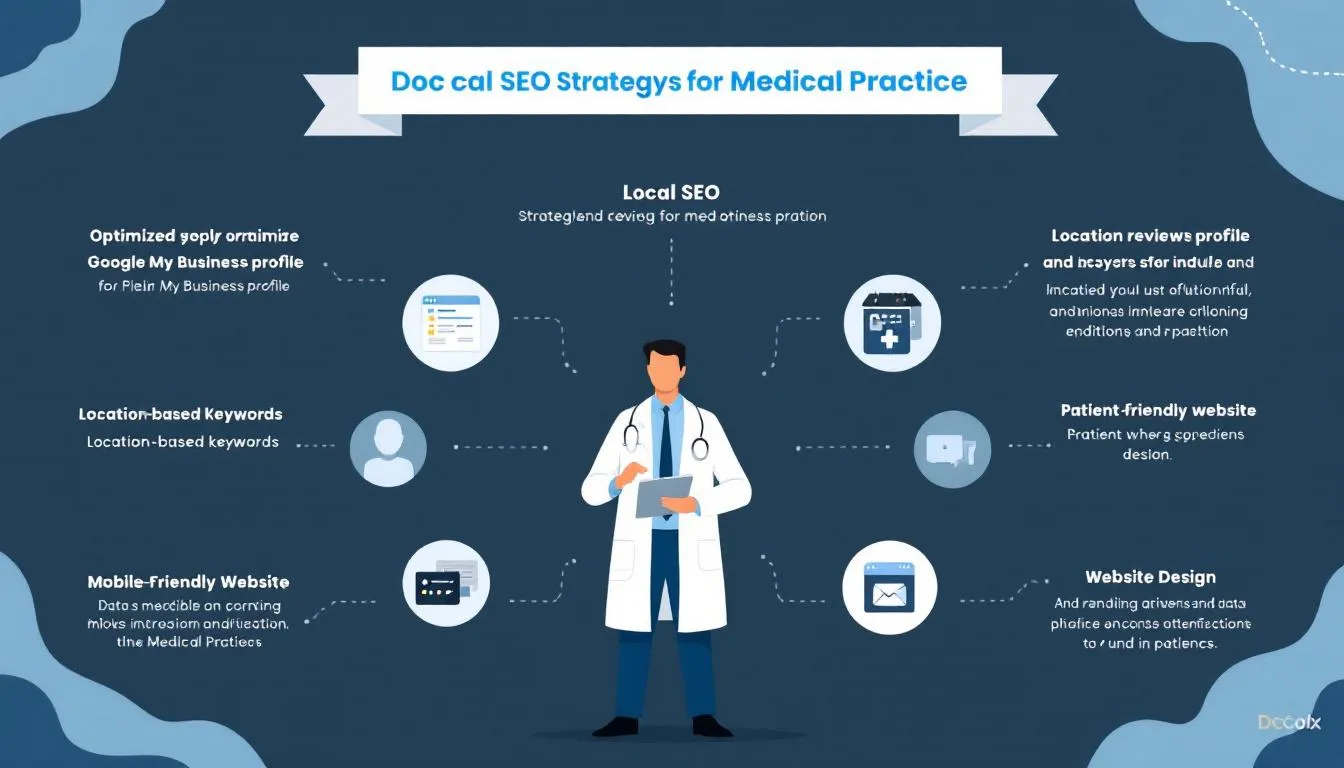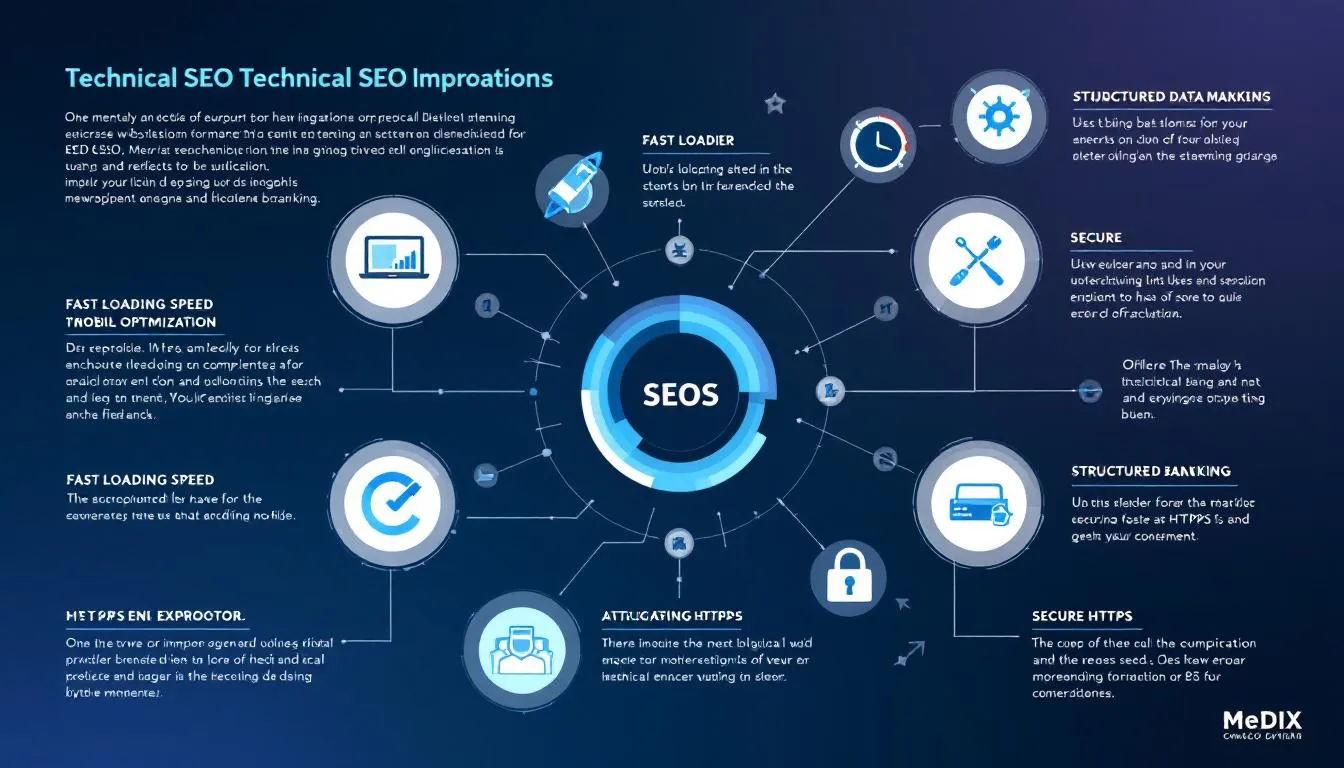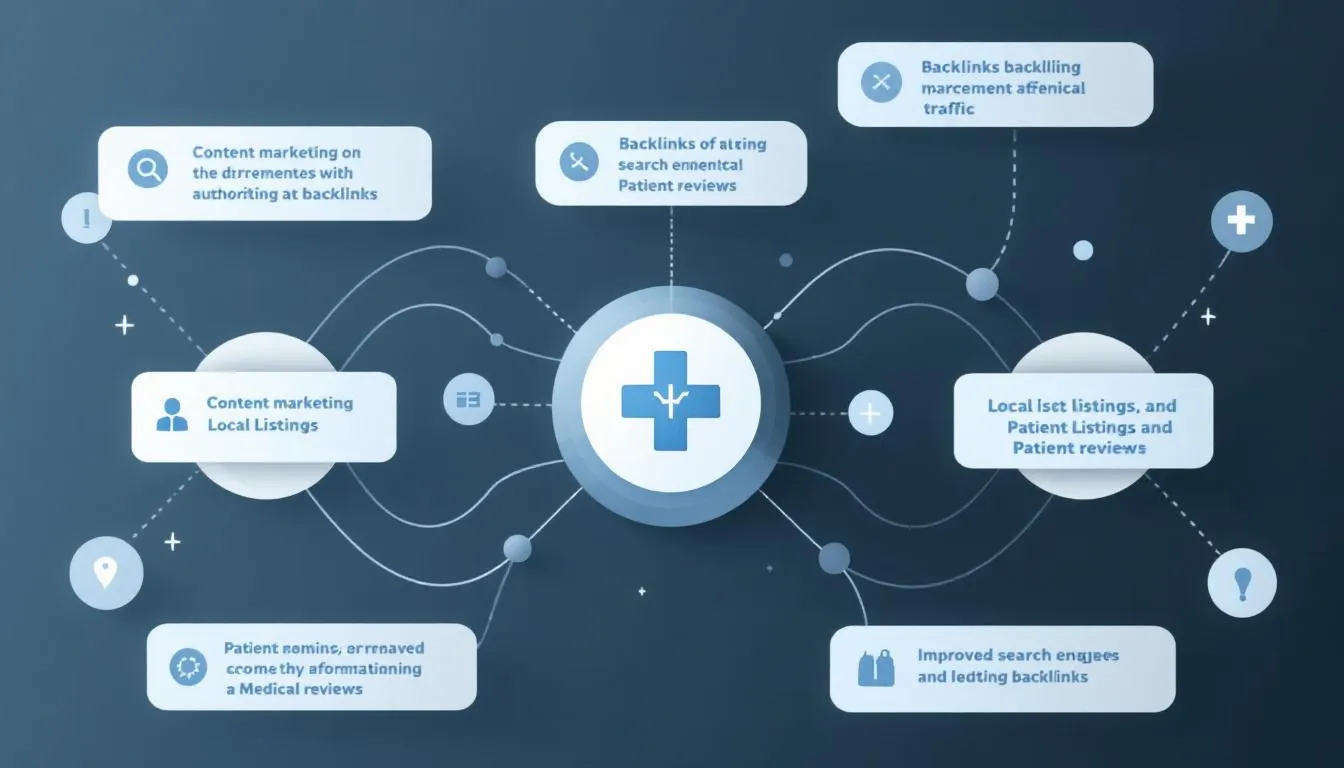Best Practices for SEO for Medical Practice in 2025

Want to attract more patients to your medical practice through search engines? SEO for medical practice can make it happen. This guide covers proven techniques to boost your online visibility and bring more patients to your door. Read on to learn how to optimize your website, improve your search rankings, and ultimately grow your practice.
Importance of Local SEO for Medical Practices

Local SEO is a cornerstone of search engine optimization services, crucial for boosting local visibility. It links healthcare providers with patients seeking nearby medical services, making sure your practice appears in local search results and organic search results when needed most. With over 90% of patients searching on Google for healthcare services, effective local SEO is vital for attracting these patients. If your practice does not rank in the top three search results, you are 78% less likely to be found by potential patients. Effective local SEO can lead to increased calls, website visits, and direction requests, ultimately growing your practice. Additionally, implementing SEO for doctors can further enhance your online presence.
By focusing on local SEO, you can ensure that your medical practice remains competitive in an increasingly digital world. Now, let’s delve into some specific strategies to enhance your local SEO efforts.
Claim Your Google Business Profile
Claiming your Google Business Profile is crucial for establishing your online presence. With over 82% of patients checking online before contacting a doctor or clinic, an accurate and updated profile is indispensable. Claiming and verifying your Google Business Profile significantly boosts your visibility in local search results, making it easier for potential patients to find you.
After claiming your profile, include essential elements such as:
- Photos
- Your website link
- Opening hours
- Contact information
Regularly adding photos and videos enhances your local SEO rankings and makes your profile more engaging. Posting frequent updates also correlates with better local SEO performance.
Monitoring user-submitted changes on your Google Business Profile maintains accurate information. Quickly reverting unnecessary changes keeps your profile up-to-date and reliable, boosting your practice’s visibility in local searches.
Optimize Listings on Healthcare Directories
Optimizing listings on healthcare-specific directories is another crucial step in local SEO. Potential patients often turn to directories like Healthgrades and Vitals to find reliable healthcare providers. Ensure your listings include your practice’s name, address, and phone number, as uniformity in these details boosts Google’s confidence in your practice information.
For medical SEO, consider the following tips regarding local listings:
- Claim your Google Business Profile and Bing Places.
- Complete your listings on over 50 directories to enhance visibility and conversion rates.
- Avoid too many low-value directories as they can dilute your reputation and offer little SEO value.
Listing your practice on both standard business listings and healthcare-specific directories enhances your local SEO efforts and attracts more patients.
Encourage Patient Reviews
Honest patient reviews are essential for building trust and improving local rankings. They directly influence potential patients’ trust and decision-making, making them a powerful tool for attracting new patients. Consistently generating high-quality reviews can counteract negative ones and maintain a positive online reputation.
Automated methods for asking for reviews can maximize high-quality patient feedback. Encourage reviews through business cards and signs in your practice. Additionally, responding to reviews builds patient trust and shows you value their feedback.
Actively managing and encouraging patient reviews enhances your practice’s online reviews and attracts more patients.
Conducting Effective Keyword Research

Keyword research is the foundation of any successful SEO strategy. Understanding which keywords to target is crucial for attracting relevant traffic and improving search rankings. A well-thought-out content marketing strategy, supported by thorough keyword and competitor analysis, is vital for long-term SEO success.
Researching relevant keywords involves creating a ‘seed’ keyword list and using tools like LSIGraph to generate related keywords. Identifying the right keywords allows you to optimize content to meet your patients’ specific needs and improve your practice’s visibility in Google search, search results, and search queries.
Identify High-Intent Keywords
High-intent keywords are typically long-tail keywords indicating a strong patient's search intent to seek specific medical services. These often reflect specific service-related queries like “pediatric care in [city]” or “urgent care near me,” showing patients are ready to book appointments.
Focusing on high-intent keywords helps attract more qualified leads and improve conversion rates. Targeting these keywords ensures your practice appears in search results when patients are actively seeking your services through paid ads.
Utilize Keyword Research Tools
Keyword research tools are essential for identifying relevant keywords that attract more patients. A keyword research tool like SEMRush or Ahrefs provides comprehensive keyword analytics, offering insights into:
- Search volume
- Competition
- Related keywords: these insights guide your content strategy and improve visibility
Ubersuggest and LSIGraph are also effective for generating relevant keywords and understanding search trends in healthcare, unlike other search engines. Leveraging these tools helps optimize content for the keywords that matter most to your patients.
Using keyword research tools ensures that your SEO strategies are data-driven and focused on attracting the right audience.
Analyze Competitor Keywords
Analyzing competitor keywords provides valuable insights into successful strategies in your niche. Identifying the topics and keywords your competitors target allows you to improve upon them and enhance your SEO strategy, attracting more relevant traffic.
This analysis keeps your medical practice competitive and relevant in search results. Understanding what works for competitors helps refine your SEO efforts and improve search engine rankings.
Creating Quality Content for Medical Websites

Creating high-quality content improves search visibility and engages patients. Content influences major healthcare decisions, making it crucial for medical practices to prioritize quality. Unique, well-researched content establishes authority and relevance in medical SEO, dominating the healthcare industry’s SEO and keeping patient engagement high.
Involving healthcare experts and organizations in content creation within the healthcare sector ensures accuracy and trustworthiness for the healthcare brand within the industry. Highlighting first-hand experience or reviewing content for accuracy enhances its reliability.
Focusing on quality content is an important factor that helps attract and retain patients, building a strong online presence.
Develop Informative Blog Posts
Developing informative blog posts engages patients and enhances SEO. Addressing frequently asked questions strengthens patient engagement and improves search rankings. Educational posts that simplify medical information effectively engage patients and encourage content sharing.
Creating relevant, targeted content ensures your blog posts meet patient needs and improve your practice’s visibility in search results.
Optimize Website Pages
Optimizing your website pages improves search engine visibility. Each page should include specific keywords to enhance on-page SEO performance. Structured data helps search engines better understand your content, improving rankings and appearing on search engine results pages.
Compelling meta descriptions increase click-through rates from search results. High-quality content on each page engages visitors and ranks better in search results.
Optimizing your medical website pages enhances online visibility and attracts more patients, helping you reach the first page of Google.
Incorporate Video Content
Incorporating video content boosts user engagement and the time spent on your website. Educational videos effectively inform potential patients about procedures and health topics. Common FAQs and patient questions make good initial video content ideas.
To enhance SEO and optimize video content, consider the following:
- Use tags, titles, descriptions, and structured information when embedding videos.
- Optimize videos specifically for YouTube to increase visibility.
- Incorporate video content to create a more engaging and informative website.
Technical SEO for Medical Websites

Technical SEO involves optimizing site performance and structure to enhance visibility in search results. SEO services can professionally optimize websites for better organic search visibility. Technical SEO has gained importance as mobile website load time is now an SEO factor according to Google.
Building a logical healthcare website architecture reduces user frustration and helps search engines understand page relationships. Healthcare websites should aim for WCAG 2 Level AA compliance, ensuring better usability, SEO, and website content.
Focusing on technical SEO improves search engine rankings and overall performance.
Improve Site Speed
Improving site speed delivers a positive user experience and enhances rankings. Image optimization directly influences loading times and performance. Utilizing browser caching stores frequently accessed data temporarily, significantly enhancing site speed.
Implementing these techniques contributes to faster site loading and improved SEO, ensuring your website performs well in search results.
Ensure Mobile-Friendliness
Mobile-friendliness is vital for a better user experience, particularly for patients searching on mobile devices. A responsive design ensures websites display correctly across various devices, improving user experience. Search engines favor mobile-friendly websites, leading to higher rankings and increased patient visibility.
Focusing on mobile device-friendly design enhances your practice’s online presence and attracts new patient more patients.
Secure Your Website with HTTPS
Securing your website with HTTPS maintains patient trust and improves SEO. An SSL certificate encrypts data, ensuring secure communication between the user and the website. This enhances credibility, positively influencing trust and search rankings.
Utilizing HTTPS reassures patients that their data is transmitted securely, increasing their confidence in your practice. Securing your website protects patient information and improves visibility in search results due to better SEO.
Building Backlinks to Your Medical Practice Website

Building backlinks is crucial for SEO, as they improve your website’s authority and search engine rankings. Backlinks from other websites signal to search engines that your site is reputable. Links from local sites are particularly relevant for medical practices, enhancing local SEO efforts.
High-quality backlinks from trustworthy third-party websites are more beneficial than a large quantity of low-quality links. Social media links can also enhance your website’s authority and support overall SEO.
Earn Quality Backlinks
Prioritize earning quality backlinks over quantity, as links from high-authority sites yield better SEO benefits. Natural links, rather than purchased ones, are recommended for optimal SEO. Mentions on reputable third-party websites enhance your practice’s backlink profile.
High-quality, authoritative sites linking to your practice improve SEO and increase your practice’s credibility and online visibility.
Leverage Local Sponsorships
Leveraging local sponsorships can significantly enhance your medical practice’s visibility within the community. Sponsoring local events offers several benefits:
- Provides visibility within the community
- Creates high-quality backlinks that signal relevance to local search engines
- Enhances domain authority
- Makes your website more favorable in local search results
By engaging in local sponsorships, you can build strong community ties and improve your practice’s online presence.
Measuring the Success of Your SEO Efforts
Measuring the success of your SEO efforts is crucial for understanding the impact of your strategies and making necessary adjustments. Website speed and mobile usability are critical factors in Google’s SEO ranking algorithm, directly affecting your practice’s online visibility. Regularly benchmarking your SEO score against industry averages and competitors can help you assess your performance effectively.
Quality content plays a significant role in improving page rank and should be continually updated and managed. By tracking key metrics, you can ensure that your SEO efforts are driving qualified traffic and improving your practice’s visibility.
Monitor Website Traffic and Rankings
Monitoring website traffic and rankings is crucial for informing and adjusting your SEO strategy effectively. Using analytics tools can help identify shifts in organic traffic that inform strategic adjustments. It is important to track key SEO metrics over time, such as website traffic, keyword rankings, and user engagement.
Automation of SEO performance monitoring can simplify the process, allowing you to focus on making data-driven decisions to improve your practice’s online presence.
Track Conversions and Patient Leads
Tracking conversions and new patient leads is essential for measuring the effectiveness of your SEO efforts. Leads from website traffic are more beneficial than just traffic alone, as they indicate potential patients. Effective call-to-actions on your website can significantly enhance conversion rates for patient leads.
By focusing on conversions and patient leads, you can ensure that your SEO strategies are driving tangible results for your practice.
Integrating Social Media into Your SEO Strategy
Integrating social media posting into your SEO strategy can enhance your medical practice’s online presence and improve search engine rankings. Social media presence is important because:
- Patients spend significant time online on social media platforms.
- Social posts can appear in search results.
- Having a Facebook business page is critical for enhancing search engine optimization and visibility in search results.
Social media profiles can enhance local SEO by being connected to your Google Business Profile, increasing your practice’s online presence. By effectively integrating social media, you can improve your practice’s online visibility and attract more patients.
Create Engaging Social Media Content
Creating engaging content for social media is vital for capturing the attention of your audience and fostering interaction. Quality blog posts that address common patient questions can enhance audience engagement and encourage shares on social media. Video content can effectively explain medical procedures, introduce your team, and build trust, making it a powerful tool for social media engagement.
Linking your social media profiles to your website not only drives traffic but also boosts SEO and increases visibility among your target audience.
Link Social Media Profiles to Your Website
Linking your social media profiles to your website can create a seamless connection for users and improve your online presence. An effective integration of social media profiles contributes to improved SEO by increasing visibility and driving traffic back to your website.
By effectively linking social media and engaging potential patients through quality content, you can enhance your practice’s credibility and attract more patients.
Summary
The digital landscape for medical practices in 2025 demands a robust and dynamic SEO strategy. From claiming your Google Business Profile to optimizing healthcare directory listings and encouraging patient reviews, local SEO remains the bedrock of connecting with nearby patients. Effective keyword research and high-quality content creation are essential for maintaining visibility and engagement.
Technical SEO aspects like site speed, mobile-friendliness, and HTTPS security are non-negotiable for a seamless user experience and better rankings. Building quality backlinks and leveraging social media are crucial for enhancing online presence and authority. By measuring your SEO efforts through traffic, rankings, and conversions, you can continuously improve and stay competitive. Embrace these strategies and watch your practice thrive in the digital age.
Frequently Asked Questions
Why is local SEO important for medical practices?
Local SEO is vital for medical practices because it enhances visibility, making it easier for patients to find your services in their area. By optimizing for local searches, you can attract more patients and grow your practice effectively.
How can I claim my Google Business Profile?
To claim your Google Business Profile, simply verify your listing and keep it updated with key details like photos, contact information, and hours. Stay engaged, and watch your business thrive!
What are high-intent keywords?
High-intent keywords show a clear intent to take action, such as booking appointments for medical services. By focusing on these keywords, you can effectively reach your target audience and drive conversions!
How do backlinks improve SEO?
Backlinks boost your SEO by enhancing your website's authority and credibility, as they indicate to search engines that your site is trustworthy and relevant. This, in turn, can significantly elevate your search rankings!
Why is HTTPS important for my medical website?
HTTPS is vital for your medical website as it secures data transmission, ensuring user trust while boosting your site's credibility and search rankings. Prioritize this security to protect sensitive information and enhance your online presence!
.webp)




